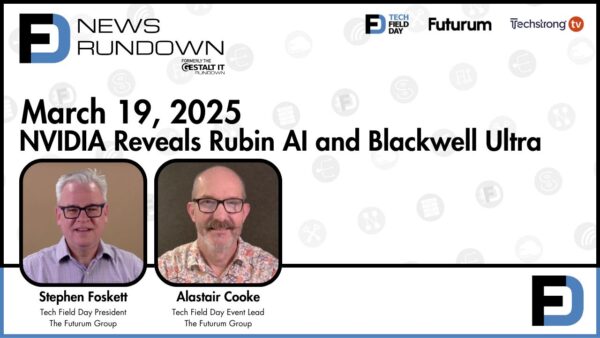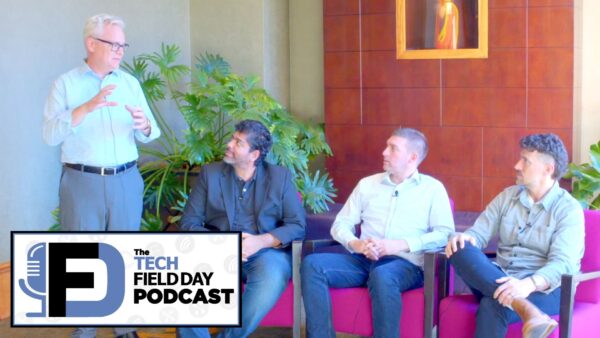NVIDIA Reveals Rubin AI and Blackwell Ultra || Tech Field Day News Rundown: March 19, 2025
NVIDIA unveiled new AI-focused chips at its GTC conference, including the Blackwell Ultra series launching this year and the next-gen Vera Rubin GPUs set for 2026. CEO Jensen Huang emphasized the company’s shift to an annual release cycle, a departure from its previous biennial schedule. This move reflects NVIDIA’s response to the growing AI market and increasing competition. This and more on the Rundown.
Apple Podcasts | Spotify | Overcast | Amazon Music | Audio | YouTube
2:29 – Taara Spun Out from Google’s Parent Company Alphabet
Alphabet has spun off Taara, its laser-based internet backbone provider, into an independent company focused on delivering high-speed connectivity to underserved regions. The newly formed company will continue developing its wireless optical communication technology, which aims to provide reliable internet without the need for traditional fiber infrastructure.
Read More: Alphabet spins off laser-based Internet backbone provider Taara
6:41 – Intel Names Lip-Bu Tan as New CEO
Intel has appointed Lip-Bu Tan as its new CEO, succeeding Pat Gelsinger who stepped down in December 2024. Tan, formerly CEO of Cadence Design Systems and an Intel board member, aims to revitalize the company by streamlining operations and focusing on advanced chip manufacturing, including AI server chips, to better compete with industry leaders like TSMC. Following the announcement, Intel’s stock surged nearly 8%, reflecting investor optimism about Tan’s strategic vision.
Read More: Intel Names Lip-Bu Tan as New CEO
12:38 – DevOps Gets Empowered by Semaphore Going Open Source
Semaphore has open-sourced its core CI/CD platform under the Apache 2.0 license, aiming to provide developers with greater flexibility and transparency. This move addresses the limitations of existing CI/CD solutions by combining enterprise-grade reliability with the customizability of open-source software. By making its codebase publicly accessible, Semaphore empowers developers to explore, modify, and enhance the platform to suit their unique requirements, fostering a community-driven approach to innovation.
Read More: Semaphore Goes Open Source: A New Dawn for DevOps Professionals
16:38 – Microsoft’s New Quantum Chip Greeted with Major Skepticism
Microsoft’s recent announcement of its Majorana 1 quantum chip, claimed to be a significant advancement in quantum computing, has been met with skepticism from the scientific community. Experts question the validity of Microsoft’s findings, citing a lack of peer-reviewed evidence and unproven underlying physics, leading to concerns about the legitimacy of the breakthrough.
Read More: Microsoft’s New Quantum Chip Greeted with Major Skepticism
22:04 – Solo.io Launches Kagent for Agentic AI-Driven Cloud Ops
Solo.io has launched Kagent, an open-source agentic AI framework designed to automate cloud-native operations within Kubernetes environments. Built on Microsoft’s AutoGen, Kagent integrates with existing tools to streamline tasks like configuration, troubleshooting, and network security, enabling DevOps teams to leverage AI-driven automation.
Read More: Solo.io’s Kagent Brings Agentic AI to Cloud-Native Operations
25:37 – Amazon, Google, and Meta Nuclear Datacenters by 2050
Amazon, Google, and Meta are investing heavily in nuclear energy as part of their strategy to achieve net-zero carbon emissions by 2050. These tech giants plan to power their operations with 100% renewable energy, with nuclear energy playing a key role in meeting their ambitious sustainability goals. Alongside nuclear, they are exploring advanced technologies like carbon capture to reduce their environmental impact and address the urgency of climate change.
Read More: Amazon, Google, Meta Are Going Super Nuclear by 2050
29:38 – NVIDIA Reveals Rubin AI and Blackwell Ultra
Nvidia unveiled new AI-focused chips at its GTC conference, including the Blackwell Ultra series launching this year and the next-gen Vera Rubin GPUs set for 2026. CEO Jensen Huang emphasized the company’s shift to an annual release cycle, a departure from its previous biennial schedule. This move reflects Nvidia’s response to the growing AI market and increasing competition.
Read More: Nvidia announces Blackwell Ultra and Rubin AI chips
40:58 – The Weeks Ahead
Upcoming Tech Field Day Events
Networking Field Day 37 – March 19 – 20
Tech Field Day Extra with HPE – April 8
AI Infrastructure Field Day 2 – April 23 – 24
Mobility Field Day 13 – May 7 – 8
Security Field Day 13 – May 29 – 30
Host Information
Stephen Foskett is the President of the Tech Field Day Business Unit and Organizer of the Tech Field Day Event Series, now part of The Futurum Group. Connect with Stephen on LinkedIn or on X/Twitter.
Alastair Cooke is a Tech Field Day Event Lead, now part of The Futurum Group. You can connect with Alastair on LinkedIn or on X/Twitter and you can read more of his research notes and insights on The Futurum Group’s website.
Gestalt IT and Tech Field Day are now part of The Futurum Group.
The Gestalt IT Rundown is your look at the IT news of the week. Be sure to subscribe to Gestalt IT on YouTube for even more weekly video content.
#AI #NVIDIAGTC #Rundown #AWSCloud #DemitasseNZ #GestaltIT #Google #GoogleCloud #Intel #IntelBusiness #Meta #Microsoft #Nvidia #SFoskett #TechFieldDay #TechstrongTV #TheFuturumGroup



